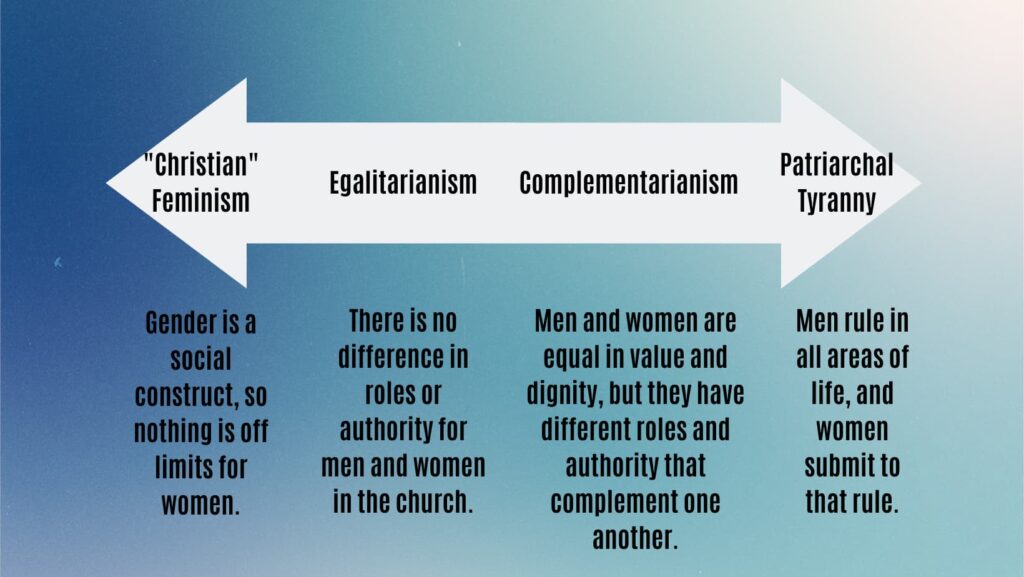When discussing the role of women in the church, there are some terms that need defining. Not only do these terms need to be defined, but we need to recognize that they are on a sliding scale. This means that not all of those who would classify themselves with the same title believe the same thing. The two main terms associated with this topic are egalitarian and complementarian. So let’s begin there.
The term egalitarian means “asserting, resulting from, or characterized by belief in the equality of all people, especially in political, economic, or social life” (dictionary.com). When we look at this word in the context of this discussion, an egalitarian believes there are no differences in role or authority between men and women in the church. Therefore, a woman is just as capable and has just as much right as a man to be a pastor, deacon, elder, or janitor. It is important to note that an egalitarian believes that men and women are different in biology, but they are equal in role and authority in the church and possibly in the home.
The other main term associated with this discussion is complementarian. This term revolves around the idea that men and women were created to complement one another. They are equal in importance, dignity, and worth (value), but they have distinct roles and levels of authority in different situations, roles that work in tandem with one another. So for the purposes of this discussion of the role of women in the church, a complementarian believes there are specific roles in the church that only a man can fill according to the Scriptures. While there are roles that are traditionally filled by women, a complementarian would not argue that, biblically, men are banned from any position in the church (though they may argue for the prudence of it).

However, we must recognize that this is a sliding scale. Some complementarians, on the “softer” side, would limit the number of positions forbidden to women, while “stronger” complementarians may ban women from any position with any level of authority even over children. If you slide too far to the stronger edge of complementarianism, you’ll land in the territory of patriarchal tyranny where men rule and women obey. While I don’t believe the patriarchy itself is a negative thing as our society tries to convey, patriarchal tyranny creates a controlling and abusive atmosphere. There is pretty solid biblical evidence against this position of abusive patriarchalism, so complementarians must be careful not to cross that line.
Likewise, if an egalitarian slides too close to the permissive edge, he will land squarely in “Christian” feminism (an oxymoron in my opinion) where gender is seen as a social construct and nothing is off limits to women or men, including blurring the gender lines. This is an idea clearly contrary to Scripture (see Genesis 1:27). So the egalitarian must watch that he does not cross into that sinful territory.
While a discussion of the biblical merits of both “Christian” feminism and patriarchal tyranny is probably superfluous, the debate between egalitarian and complementarian ideas rages on. As we approach this discussion in upcoming posts, there are a few things to keep in mind:

1. This discussion in Scripture is limited to the church. Nowhere does Scripture elicit a debate about the role of women in politics, business, education, etc. If you are delving into that territory, you are wading into tyrannical waters. In fact, I believe I can make a pretty clear case for women in those arenas with Scriptural support. One only needs to look at the Proverbs 31 woman to begin the discussion.
2. The conflict is only about the authority a woman has over men, not children or other women, in the church. Scripture encourages women to teach other women and to teach children, though it is important to decide when a boy becomes a man if you fall into the complementarian camp.
3. Scripture addresses the topic of the submission of women in only two arenas: the home and the church. It does not teach that all women are to submit to all men. It does not teach that all women are subject to all men in the church. And it is important to point out that Scripture clearly teaches that we are all to submit to one another, the husband and wife and the priesthood of believers. We must tread lightly so we do not take this further than Scripture does.
Note: We will not be broaching the subject of the wife’s submission to her husband because each home can look different while adhering to God’s standards, so we will limit our discussion to the church arena where Scripture gives guidelines for all believers to follow.






Hi Kelli. This topic is one I have been struggling to define and biblically rather than “traditionally.” I was unfamiliar with these terms before reading this article and found these explanations helpful. I am eager to read further posts on this subject as I study it out for myself also.
Valerie, I’m so glad it was helpful. I have written a few other posts on this subject as I have been studying it out. I have linked them in this post for easy access.